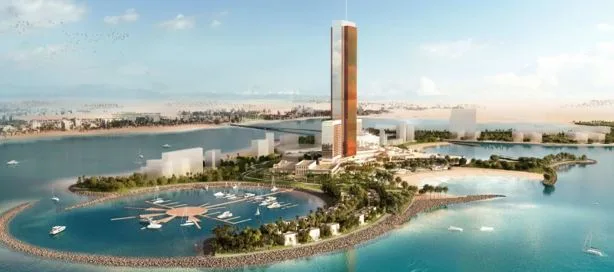Ras Al Khaimah Casino Resort Locked In for 2027 Opening
Wynn Al Marjan Island, a US$5.1 billion resort set to host the UAE’s first licensed casino, has passed the 60% construction mark and is on track for a 2027 debut in Ras Al Khaimah.
While the resort’s structural frame is rising rapidly, the pace on the ground is immediate: an average of one floor is being completed every week, supported by a workforce of around 9,100 construction personnel and over 100 concrete trucks in constant rotation.
Covering some 60 hectares of beachfront property, the development includes 1,542 rooms and will sit just 50 minutes from Dubai International Airport, aimed at attracting both regional and global tourists seeking a luxury break at the Gulf’s newest destination.
In October 2024, Wynn secured the UAE’s first commercial gaming license—an unprecedented step for the country—authorized by the newly formed General Commercial Gaming Regulatory Authority, chaired by former MGM Resorts CEO Jim Murren. That framework mirrors international standards, comparable to Nevada’s model, yet it reflects local social dynamics: regulators have introduced strict “cooling-off” periods, betting limits, and culturally sensitive restrictions to align with a majority-Muslim population.
As the groundwork for regulated gaming takes shape, users are already interacting with modern formats that remain within legal boundaries yet feel familiar. Much of that momentum has shifted toward systems built around promotional play, where credit-based entry and prize-driven outcomes carry over casino mechanics into digital space.
With these setups becoming more visible, curiosity around how sweepstakes casino bonuses work has grown, particularly as more users engage with slots, table games, and prize wheels without triggering regulatory thresholds.
These low-risk formats are proving useful for spotting early behavioral patterns, offering regulators a clearer view of how incentive-based participation could scale. That insight has shaped a regulatory approach both precise and cautious.
GCGRA officials say progress is steady, with Wynn still holding the only land-based casino licence. Recent government guidelines on advertising and age protections point to a staggered expansion designed to reflect public expectations. Other emirates, including Abu Dhabi and Dubai, are already in talks with global operators like MGM, but new licences are expected to come gradually over the next decade.
While gaming occupies only 4% of the Wynn resort’s total area, the broader economic outlook is significant. Industry research estimates that three UAE integrated resorts could generate up to $8.6 billion in annual gaming revenue, surpassing the Las Vegas Strip’s output of $8.4 billion in 2023.
Indeed, that forecast reflects more than industry optimism. Over 27% of UAE adults would consider participating in regulated casino gaming, with comparable interest in sports betting. Digital formats have been pulling in steady attention, from fantasy setups to reward-based gaming apps. Esports now anchors much of that movement, bringing in close to $14 million in 2024, with wider mobile gaming expected to top $490 million by 2027.
Behind that rise is serious backing—Wynn’s $2.4 billion construction loan, the largest in UAE hospitality history, reflects how much weight is now moving toward this sector. Analysts forecast that investment will elevate waterfront real estate values across Ras Al Khaimah by over 25% by 2030, as the region pivots toward luxury leisure and tourism.
Still, not every response has centred on financial return. Religious leaders and conservative policymakers have warned of long-term social tension if regulations are perceived to loosen or drift toward digital gaming.
While physical casinos remain strictly licensed, concerns around spillover into mobile platforms or foreign-hosted websites have already begun to shape the ongoing regulatory debate, particularly in a nation where religious identity still anchors public policy.
Whether the broader audience will embrace a new era of gaming—or resist it at the margins—may ultimately depend less on policy than on how seamlessly these changes embed into daily life.





